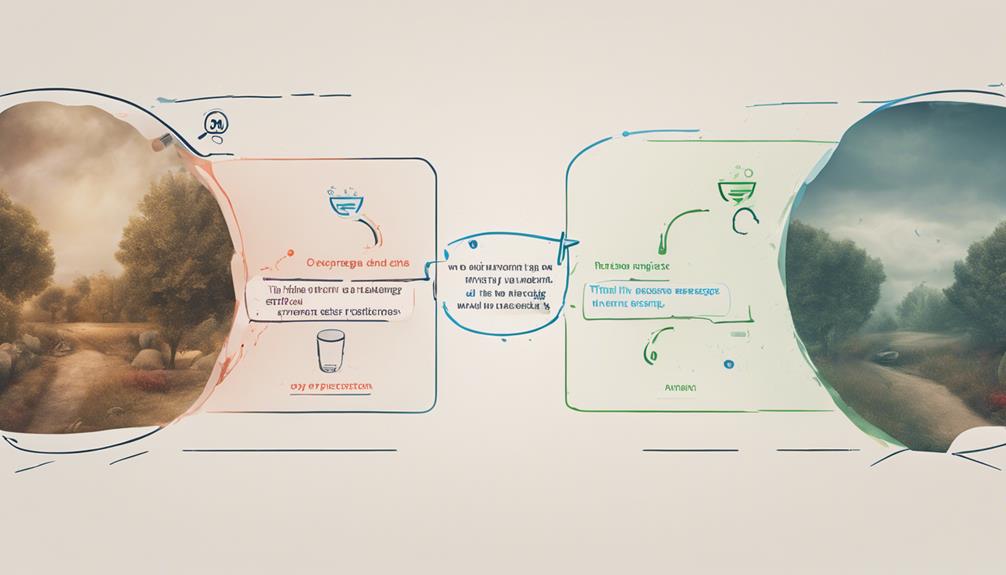Subliminal hypnosis techniques involve hidden suggestions that impact cognitive processes and behavior. A comparative analysis delves into visual versus auditory delivery methods, direct versus indirect suggestions, and ethical considerations. Understanding the nuances maximizes the effectiveness of these techniques in behavior modification. The influence of subliminal messaging on consumer behavior, decision-making, and perceptions is significant. Ethical practices, participant experiences, and lasting behavioral changes are key areas for exploration. In exploring subliminal hypnosis techniques, one can uncover the intricate mechanisms behind cognitive influence and behavior modification for a deeper understanding.
Research Studies on Subliminal Hypnosis

The efficacy of subliminal hypnosis has been the subject of numerous research studies aimed at evaluating its impact on cognitive processes and behavior modification.
Researchers have delved into the intricate workings of subliminal hypnosis, exploring the effects of hidden suggestions on brainwave frequencies and subconscious responses.
Studies have shown that subliminal messages delivered during hypnosis can influence brainwave patterns, leading to altered states of consciousness and heightened suggestibility.
Moreover, the psychological impact of these hidden suggestions has been a focal point of investigation, with findings suggesting that they can tap into the subconscious mind, influencing attitudes, beliefs, and behaviors.
Through controlled experiments and empirical data, researchers have sought to uncover the mechanisms underlying subliminal hypnosis and its potential for facilitating positive changes in individuals.
Comparison of Delivery Methods
Various modalities of delivery exist for implementing subliminal hypnosis, each with distinct advantages and potential implications for cognitive processes and behavioral outcomes. When considering visual versus auditory delivery methods, research suggests that visual stimuli may be processed faster by the brain due to the direct connection to the occipital lobe, while auditory cues can lead to deeper emotional responses as they are often associated with our inner thoughts and feelings.
In terms of direct versus indirect delivery, direct suggestions are explicit commands given to the subconscious mind, potentially leading to quicker behavioral changes, whereas indirect suggestions are more subtle and can be effective in bypassing conscious resistance.
Studies have shown that visual stimuli may be more effective in triggering immediate responses, while auditory cues can have a longer-lasting impact on behavior. Direct suggestions are often preferred for addressing specific issues promptly, while indirect suggestions may be more suitable for complex psychological processes.
Understanding the nuances of these delivery methods is crucial for maximizing the effectiveness of subliminal hypnosis techniques.
Analysis of Subliminal Messaging

Analysis of subliminal messaging involves examining the subtle cues and stimuli intentionally crafted to influence subconscious processes without conscious awareness. These hidden suggestions are designed to evoke a subconscious response, impacting individuals' psychological processes and subsequent behaviors.
Understanding the psychological impact of subliminal messaging is crucial in comprehending its potential effects on consumer behavior. Research suggests that subliminal messages can influence individuals' perceptions, preferences, and decision-making processes without their explicit awareness. By bypassing conscious scrutiny, these messages may tap into deep-seated emotions and desires, shaping individuals' attitudes and actions.
The subtlety of subliminal messaging poses ethical considerations regarding manipulation and consumer autonomy. Studies have demonstrated that subliminal messages can affect purchasing behavior, brand perception, and even interpersonal interactions. However, the extent of their influence and long-term effects remains a topic of debate among researchers.
Further exploration into the mechanisms underlying subliminal messaging is essential to grasp its full implications on consumer behavior and ethical marketing practices.
Effectiveness in Behavior Modification
Research indicates that subliminal hypnosis techniques have shown potential effectiveness in behavior modification. Studies have suggested that these techniques can have lasting effects on individuals, influencing behavior beyond the immediate session.
Participants often report varied experiences, with some describing subtle shifts in their thinking patterns or responses to stimuli. This suggests that subliminal messages delivered during hypnosis can have a profound impact on the subconscious mind, leading to cognitive responses that may not be consciously acknowledged.
The subconscious influence exerted by subliminal hypnosis techniques can result in changes in behavior that endure over time. While the exact mechanisms behind these effects are still under investigation, it is evident that participants' experiences play a crucial role in determining the success of behavior modification through hypnosis.
Ethical Considerations in Hypnosis

Ethical considerations play a pivotal role in the practice of hypnosis, guiding practitioners in maintaining integrity and ensuring the well-being of their clients. Patient consent is a fundamental ethical principle in hypnosis, requiring therapists to obtain explicit permission from individuals before inducing a hypnotic state. This consent should be informed, voluntary, and based on a comprehensive understanding of the process and potential outcomes.
Moreover, therapists bear the responsibility to prioritize the welfare of their clients throughout the hypnosis session, ensuring that all interventions are aimed at benefiting the individual without causing harm.
Moral implications in hypnosis revolve around the need for therapists to uphold professional boundaries. This includes maintaining confidentiality, respecting autonomy, and refraining from exploiting the vulnerability of clients. Establishing clear guidelines regarding the scope of practice and the limitations of hypnosis can help practitioners navigate ethical dilemmas effectively.
Frequently Asked Questions
Can Subliminal Hypnosis Techniques Be Used for Self-Improvement?
Subliminal hypnosis techniques can effectively aid in personal growth by utilizing subconscious influence to instill positive affirmations. Through mental reprogramming, individuals can harness the power of their minds for self-improvement and overall well-being.
Are There Any Potential Risks Associated With Subliminal Hypnosis?
When considering subliminal hypnosis, it is crucial to acknowledge potential risks. Ethical considerations demand scrutiny of hidden dangers. Psychological impact could lead to potential harm, necessitating thorough research and caution before engaging in such techniques for self-improvement.
How Long Does It Take to See Results From Subliminal Hypnosis?
The effects of subliminal hypnosis vary among individuals. While some may experience immediate effects, others may notice gradual progress over time. Measurable changes may manifest subtly, with shifts becoming more apparent with continued practice and reinforcement.
Can Subliminal Hypnosis Help in Overcoming Phobias or Fears?
Subliminal hypnosis can be a valuable tool for fear management and phobia treatment by enabling subconscious reprogramming. Research suggests its potential in providing anxiety relief through targeted messaging, though individual results may vary.
Are There Age Restrictions for Using Subliminal Hypnosis?
Legal considerations dictate that age restrictions may apply to subliminal hypnosis due to cognitive development concerns. Parental consent is often required for minors. Ethical implications surrounding manipulation and consent raise important questions about its use on children.
Conclusion
In conclusion, the exploration of subliminal hypnosis techniques through research studies provides valuable insights into the potential benefits and limitations of this approach.
Comparison of delivery methods, analysis of messaging, effectiveness in behavior modification, and ethical considerations are all important aspects to consider.
Further research and ethical considerations are necessary to fully understand the impact of subliminal hypnosis on individuals and society as a whole.
